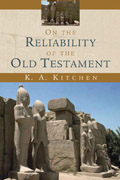
Kenneth A. Kitchen
Reviewed by: James T. Dennison, Jr.
On the Reliability of the Old Testament, by Kenneth A. Kitchen. Published by Eerdmans, 2003. Hardback, 662 pages, list price $45.00. Reviewed by James T. Dennison, Jr., academic dean and professor of church history and biblical theology at NorthwestTheological Seminary, Lynnwood, Washington (nwts. edu and kerux.com).
In this hefty tome, we have what may be Kitchen's magnum opus (at least for students of the Bible). Projected for years, I recall his lament when I first corresponded with him in 1975 - it is "badly held up, and likely to remain so
at present." Praise God, it has happened. Here is a tour de force to knock the liberal-critical socks off the enemies of history, the enemies of facticity, the enemies of biblical credibility, the enemies of orthodoxy. Tragically, but predictably (given the blinders they wear), they will dismiss it as "rot," even as Kitchen himself has quipped vis-a-vis the title. In fact, the rot arises from the pipe dreams and hallucinations of the mainline historical-critical fraternity of the past 200 years. Minimalist, Deuteronomist, documentary hypothesist, reductionist, antisupernaturalist: they are all purveyors and spewers of rot. And they have all met their well-deserved match in Professor Kitchen.
Would that Kitchen had not sullied this magnificent apology for the historically reliable biblical record with the late date for the Exodus (i.e., 1300 B.C.), instead of the biblically authenticated 1447/46 B.C. (per 1 Kings 6:1). Sadly, this defect skews Kitchen's presentation of the Mosaic era and its sequel, the period of the Judges. But our author is back on track with the United Monarchy and thence happily, with no deviations, to the post-Exilic era.
The wealth of Kitchen's forty-plus-year career as a world-class Egyptologist (University of Liverpool, England) is reflected in a wealth of illustrations, exegetical insights, archaeological corroborations, and theological affirmations from the Patriarchal to the threshold of the Christian era. The whole is carefully and meticulously laid out with ample documentation (100 pages of footnotes!) from archaeological texts, digs, reports, and surveys. Kitchen's knowledge of ancient Near Eastern literature is encyclopedic! He has brought to bear upon the biblical text of the Old Testament the latest extrabiblical information so as to enlarge our understanding of God's revelation in the history of his people.
We put down this volume even more convinced of the historicity of the events of the Old Testament and are thereby confirmed once more in our faith in the inerrancy of the inspired Word of God. One measure of serious attention to these issues of historicity and credibility (let alone infallibility) of the biblical record in contemporary evangelical and Reformed institutions (seminaries, colleges, Bible schools, seminar groups, learned associations and societies) will be whether Kitchen's book becomes required reading. If evangelical and Reformed students, pastors, and Old Testament professors are truly serious about the text of the Old Testament and its historicity, this volume will be mandatory. If they are not, Kitchen will be mere window dressing as filler on syllabi and bibliographical lists. Let us hope that the community Kitchen aims to serve with this magnificent volume does not respond in kind with the inevitable response of his liberal detractors - the book is ROT.
We regard Kitchen's On the I Reliability of the Old Testament not as ROT, but as a Rich Omnibus of Truth.
(Taken with permission from "K. A. Kitchen on the Old Testament: A Review," by James T. Dennison, Jr., Kerux: The Journal of Northwest Theological Seminary, 20/2 (September 2005):47- 48, 57.)
August 24, 2025
August 17, 2025
Reformed Covenant Theology: A Systematic Introduction
August 10, 2025
August 03, 2025
July 27, 2025
July 20, 2025
July 13, 2025
© 2025 The Orthodox Presbyterian Church